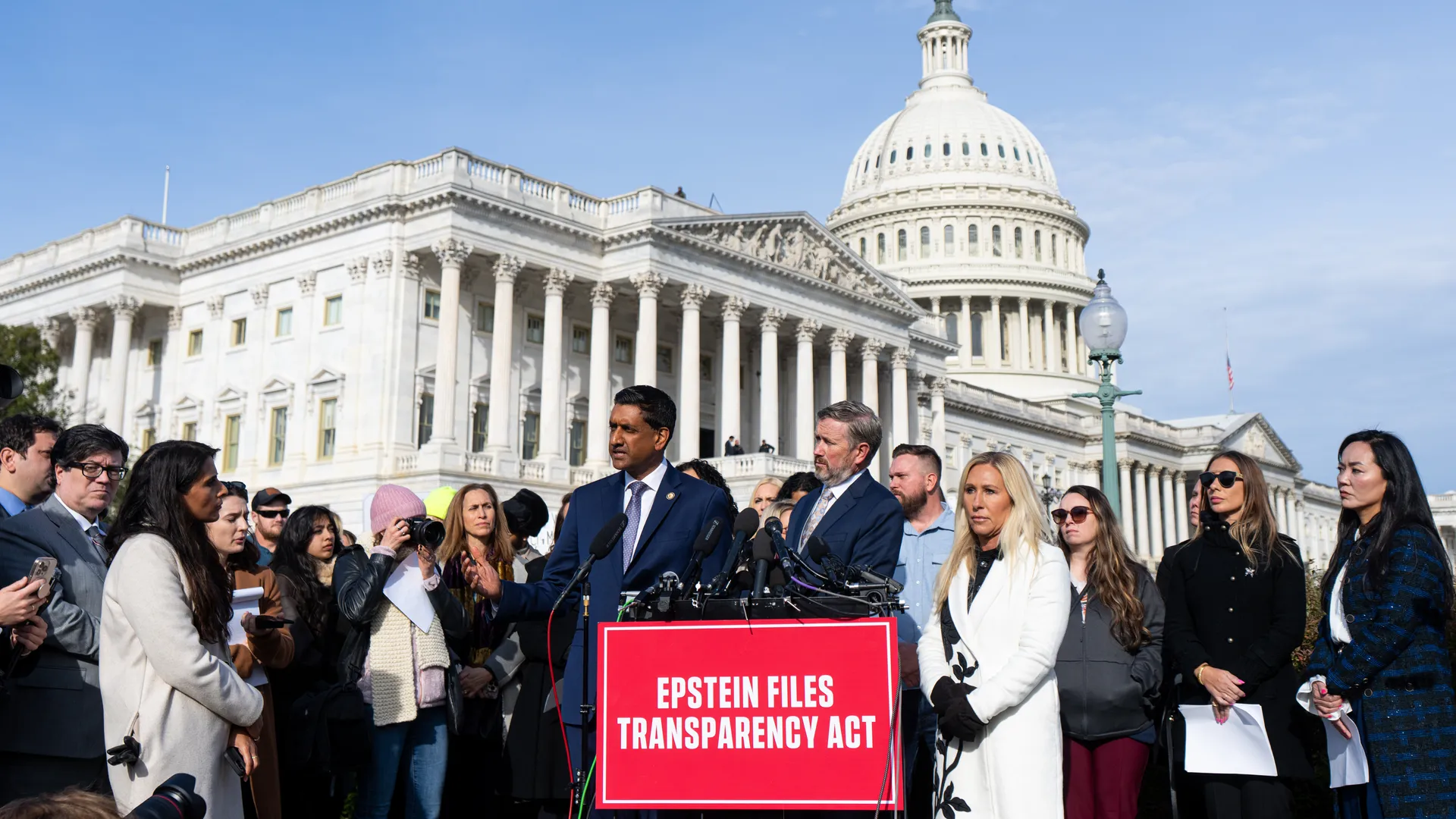The political fallout surrounding newly surfaced Jeffrey Epstein communications took another sharp turn Tuesday as comments from one of Capitol Hill’s most prominent Democrats ignited pushback from the White House and fueled new scrutiny of the party’s leadership. What began as a heated House debate over a censure resolution quickly expanded into a broader political crisis — one that shows no signs of slowing down.
Raskin Downplays Epstein Texts, Touching Off a Firestorm
During debate over a Republican-led resolution to censure Delegate Stacey Plaskett (D–U.S. Virgin Islands), Rep. Jamie Raskin — the ranking Democrat on the House Judiciary Committee — attempted to minimize the significance of Plaskett’s 2019 text exchanges with Epstein.
The messages, released earlier this month as part of a 20,000-document cache from Epstein’s estate, detailed how Plaskett coordinated with Epstein during the February 27, 2019 House Oversight Committee hearing featuring Michael Cohen, former attorney to President Donald Trump.
Raskin, however, brushed off the episode:
“They’ve arraigned a Democratic member for taking a phone call from her constituent, Jeffrey Epstein, in the middle of a hearing.”
He added:
“I don’t think there’s any rule here against taking phone calls in a hearing.”
Republicans responded with disbelief. Within minutes, Raskin’s comments were circulating across social media, prompting immediate reaction from the White House.
White House: “These People Are SICK!”
The White House rapid-response team blasted Raskin on X, calling him “one of the worst to ever disgrace the halls of Congress.”
Their statement accused Raskin of excusing what they described as clear coordination between Plaskett and a convicted sex offender — and doing so casually.
White House deputy press secretary Abigail Jackson was even more pointed, asking:
“Why is Raskin trying to downplay his colleague chatting with a convicted sex offender? Is it because he knows his colleague Hakeem Jeffries also wanted dinner with Epstein? Or is he worried about what else will be revealed about Dems…?”
It was one of the most aggressive responses from the administration since Epstein-related revelations began circulating again this month.
Social Media Reacts: “Let the Person Who Hasn’t Colluded…”
Online commentators wasted no time weighing in.
A popular X user named Bonchie wrote:
“Let the person that hasn’t colluded with a convicted sex offender to rig the questions in a hearing cast the first stone.”
Another user, “Western Lensman,” posted a video juxtaposing Raskin’s comments with his own past CNN interview, where he accused Trump of deflecting attention from issues related to “child sex trafficking,” and claimed Trump’s “name appears throughout the Epstein files.”
The contrast struck many viewers as hypocritical.
Investigative Journalist: Raskin Is “Incredibly Dishonest”
Independent reporter Lee Fang — who has covered Epstein’s network extensively — delivered one of the most detailed rebukes.
He said Raskin’s framing was:
“Incredibly dishonest.”
Fang reminded the public that Plaskett had longstanding ties to Epstein long before her 2019 text exchange:
-
As a Virgin Islands official, she helped Epstein secure tax benefits
-
She later worked for Epstein’s longtime fixer
-
Epstein and his associates funded key parts of her 2014 campaign
To Fang, Raskin’s dismissal wasn’t just inaccurate — it was deliberately misleading.
What Plaskett’s Messages Revealed
The newly released documents show Epstein gave Plaskett explicit advice about how to question Michael Cohen during his high-profile testimony.
One text from Epstein urged her:
Cohen “opened the door to questions re who are the other henchmen at the Trump Org.”
Plaskett replied:
“Yup. Very aware and waiting my turn.”
To Republicans, this was clear evidence of improper coordination with a convicted sex offender — one who had deep connections across elite political, financial, and social circles.
To Democrats, the GOP was weaponizing a routine interaction to create a scandal.
But Raskin’s dismissive tone turned a partisan fight into a national story.
Censure Resolution Fails — But the Drama Doesn’t
Ultimately, the motion to censure Plaskett and remove her from the House Intelligence Committee failed, 214–209.
But the tight vote reflected the deepening divide not only between parties, but within the Democratic caucus itself — where some members were reportedly alarmed at the resurfacing of Epstein-linked scandals.
The failure of the censure did little to tamp down the controversy. If anything, it escalated it.
Republicans vowed to revisit the issue. Conservative media amplified the reaction. And public demand for transparency intensified.
House Votes 427–1 to Release ALL Epstein Files
Earlier Tuesday, the House took broad bipartisan action — passing a 427–1 resolution requiring the Department of Justice to release every file in its possession related to Jeffrey Epstein.
The measure stunned political observers due to its near-unanimous support; even lawmakers typically reluctant to reopen Epstein-related investigations voted in favor.
The lone dissenting vote has yet to be publicly explained.
But the message from Congress was unmistakable:
The public wants answers — all of them.
The Bigger Context: Epstein’s Shadow Over U.S. Politics
Epstein was arrested on federal sex-trafficking charges in July 2019 — less than six months after the Plaskett messages — and found dead in his Manhattan jail cell that August.
For years, documents related to Epstein’s network have been tightly restricted. But recent disclosures, including the 20,000-document release by the House Oversight Committee on November 12, have reignited scrutiny.
The revelations have shown:
-
Widespread contact between Epstein and influential public figures
-
The influence Epstein wielded over officials in the U.S. Virgin Islands
-
Financial networks used to enable and conceal his operations
-
Possible political favoritism and corruption
Against that backdrop, Raskin’s attempt to portray the 2019 exchange as innocuous was bound to draw a strong reaction.
Why Raskin’s Comments Hit a Nerve
Three factors magnified the backlash:
1. The tone was dismissive — even mocking.
Calling coordination with Epstein “taking a phone call from a constituent” struck many as insulting to victims and misleading to the public.
2. The timing was disastrous.
Raskin made the statement the same day Congress demanded full Epstein transparency.
3. Epstein’s political connections remain an open wound.
Every new document release reopens old questions, implicates new names, and raises doubts about who knew what — and when.
In that climate, even a single offhand remark becomes a flashpoint.
Where This Fight Goes Next
Plaskett’s future on the Intelligence Committee remains uncertain. Republicans have vowed to revisit removal efforts. Ethics complaints may follow. And with DOJ now under pressure to release all Epstein files, the controversy is almost guaranteed to grow.
Raskin, meanwhile, faces:
-
A political backlash
-
A PR crisis
-
Ongoing scrutiny over his party’s handling of Epstein-linked figures
White House officials have indicated they may continue to press the issue — especially if more damaging information emerges from the upcoming document releases.
One senior GOP aide put it this way:
“If Democrats want to pretend Epstein was just a ‘constituent,’ they’re going to have a very rough year ahead.”

Emily Johnson is a critically acclaimed essayist and novelist known for her thought-provoking works centered on feminism, women’s rights, and modern relationships. Born and raised in Portland, Oregon, Emily grew up with a deep love of books, often spending her afternoons at her local library. She went on to study literature and gender studies at UCLA, where she became deeply involved in activism and began publishing essays in campus journals. Her debut essay collection, Voices Unbound, struck a chord with readers nationwide for its fearless exploration of gender dynamics, identity, and the challenges faced by women in contemporary society. Emily later transitioned into fiction, writing novels that balance compelling storytelling with social commentary. Her protagonists are often strong, multidimensional women navigating love, ambition, and the struggles of everyday life, making her a favorite among readers who crave authentic, relatable narratives. Critics praise her ability to merge personal intimacy with universal themes. Off the page, Emily is an advocate for women in publishing, leading workshops that encourage young female writers to embrace their voices. She lives in Seattle with her partner and two rescue cats, where she continues to write, teach, and inspire a new generation of storytellers.









